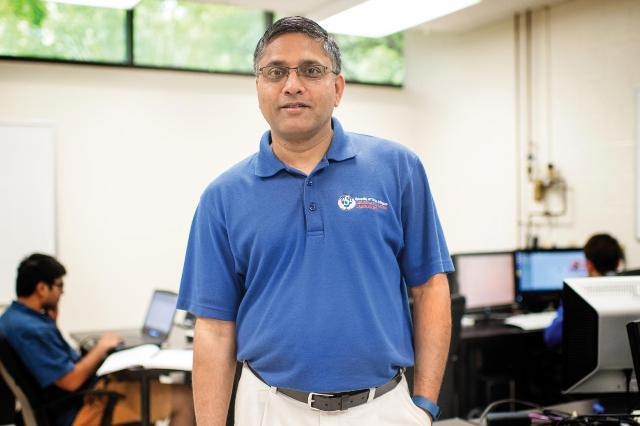May 30 2016
A University of Texas at Arlington aerospace engineer has won an Air Force Research Laboratory grant to improve the ability of unmanned vehicle systems to work together and better analyze data collected within an environment.
 Kamesh Subbarao, associate professor of mechanical and aerospace engineering, has received an Air Force Research Labortary grant that will allow unmanned systems better communicate with each other. (credit: UT Arlington)
Kamesh Subbarao, associate professor of mechanical and aerospace engineering, has received an Air Force Research Labortary grant that will allow unmanned systems better communicate with each other. (credit: UT Arlington)
Kamesh Subbarao, an associate professor of mechanical and aerospace engineering, has received a three-year, $201,000 grant from the Air Force Research Laboratory to create an algorithm that will allow cooperative control of multiple spacecraft and address uncertainties and time delays in the information received.
If successful, Subbarao’s work would allow the Air Force to assign multiple satellites to an object and collect information about it, such as its size, chemical makeup, atmospheric conditions and other data. It also would allow for “smart” deployment that would increase efficiency, yield the most pertinent information and reduce mission costs.
“If a single spacecraft is observing an object in orbit, its coverage is limited because once the object goes out of view the spacecraft can no longer observe it. We are working to create an algorithm that will allow multiple satellites to be assigned to observe an object, keeping it in constant view and eliminating interference and time delays that cause uncertainties in the data,” Subbarao said.
This particular grant applies to spacecraft, but the algorithm Subbarao develops ultimately could be used on any unmanned platform. For instance, teaming unmanned ground, air and space vehicles to collect information on disaster site monitoring, forest fires or hurricanes from three different viewpoints would give rescuers or scientists the most complete data possible.
Subbarao’s research is an example of UTA’s work in data-driven discovery, as outlined in the University’s Strategic Plan 2020: Bold Solutions | Global Impact.
Efficient, precise analysis of data is becoming more important in today’s world, said Erian Armanios, UTA Mechanical and Aerospace Engineering Department Chair.
“As humans continue to use increasingly complex data to explore and interpret our world, it is imperative that we ensure that the data used is as precise as possible. Dr. Subbarao’s work could have an effect on multiple areas of data-driven discovery by allowing better analysis of data, especially when it comes to forecasting. Planning based upon projection of needs is as good as the quality of collected data,” Armanios said.
Subbarao and his students will work with the Air Force Research Laboratory to refine simulation models to make sure that his results are reliable. The grant also provides funding to test findings of a prototype algorithm on rover platforms.
Subbarao joined the UTA faculty in 2003 and is a leader of UTA’s Aerospace Systems Laboratory, which conducts research in modeling, simulation and control of mechanical and aerospace systems from a dynamic systems perspective.
He is part of a team that is developing safety systems for unmanned aircraft. Subbarao’s own research focuses on position determination of UAVs using sensors, tracking them for conflict prediction and collision avoidance. He also is developing systems to use existing cellular infrastructure and the Internet to provide locations of UAVs, especially in non-GPS areas.
UTA’s research into unmanned vehicles received a boost in 2014 when the UTA Research Institute received an FAA Certificate of Authorization that allows UTARI to fly and test unmanned vehicles. The College of Engineering offers interdisciplinary certificate programs in unmanned vehicle system technologies and applications.
About The University of Texas at Arlington
The University of Texas at Arlington is a R-1 Carnegie “highest research activity” institution of more than 53,000 students in campus-based and online degree programs and is the second-largest institution in The University of Texas System. U.S. News & World Report ranks UTA fifth in the nation for undergraduate diversity. The University is a Hispanic-Serving Institution and is ranked as the top four-year college in Texas for veterans on Military Times’ 2016 Best for Vets list. Visit www.uta.edu to learn more, and find UTA rankings and recognition at www.uta.edu/uta/about/rankings.php.
-- written by Jeremy Agor